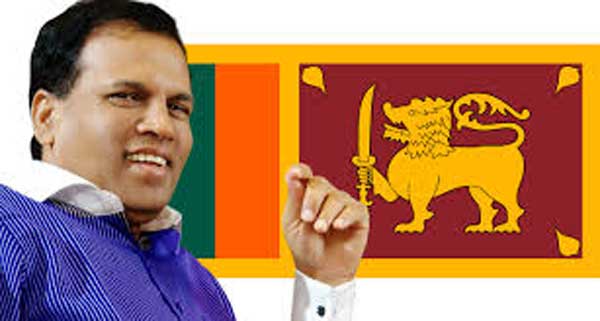Will Maitripala Srisena’s assumption of Office as the Sri Lankan president bring in a transformational ascendancy in bilateral ties? Though I am an optimist, I for one, would like to keep my fingers crossed and I have strong enough reasons to do so.
The Sri Lankan authorities are convinced that relations with none of its neighbours should be at the cost of others. Beijing will also witness several bilateral compacts including purchase by Colombo of nuclear reactors.
Sirisena will visit Islamabad and Beijing as well :
Ever since Sirisena’s visit to India (which is being much tom-tommed about by political and military analysts in India) Islamabad has expressed its concerns to Colombo that its closeness to its immediate northern neighbour will bring back bad memories of the past decades, which made the Island nation bleed solely due to New Delhi’s harbouring “sinister designs” against Colombo –which made an ordinary mortal like Prabhakaran into a hero in the north and east of Sri Lanka. According to the Asian Tribune of Feb 22, 2015 (a Colombo daily) Sirisena will pay a State visit to Pakistan in March –where the two countries will enter into a civilian nuclear cooperation agreement –details for which are being worked out. In fact, this was planned to have been done by the former president Rajapaksa, who was unable to undertake the visit due to road side protests and political unrest during that juncture in Pakistan. Siri Lanka’s High Commissioner to Pakistan Air Chief Marshall (retd) Jayalath Weerakodi has confirmed the plan . Also planned during the visit is a free trade agreement.
In order to put neighbourly relations on an even keel, the Sri Lankan prime minister will immediately thereafter visit Beijing. The Sri Lankan authorities are convinced that relations with none of its neighbours should be at the cost of others. Beijing will also witness several bilateral compacts including purchase by Colombo of nuclear reactors
Rajapaksa dug his own grave:
Rajapaksa’s defeat came about from an intensely unpopular governance style, which on occasions, witnessed State cruelty. Unarmed protesters were killed by security forces in campaigns of fisher folk, free trade zone workers, and for clean water. The Prevention of Terrorism Act was used to harass and torture the victims of army’s brutality on those who had supported the Eelam. The media was muzzled. Projects without any economic viability were undertaken. Many of these involved humongous sums- such as the international airport and sea port in the Rajapaksa electorate of Hambantola. Of course, endemic corruption and nepotism, also became devastating weapons for the rainbow Opposition.
Executive presidency, per se, may not be harmful for a robust democracy, but its blatant misuse does not sell with the common people.
Srisena’s recent India visit has offered it much to smile, not merely because he chose India as his first port of call, but also because as pundits believe, the various accords signed will be a cementing glue, whose adhesive quality will painlessly erase the bitter memories of the Rajapaksa regime….
In order to purchase loyalty Rajapaksa promoted a pliant parliament. Many among the legislator stooges of the former president were murderers, extortionists and drug peddlers. Many others embezzled public funds without monitoring or even State audit . In the present day world eye brows would rise if siblings and family members held top positions of authority, as was the case with Rajapaksa, his one brother Gotabaya was the Defence Minister, another Basil was in charge of Economic Development and the third Chamal was in the Sri Lankan legislature as the Speaker.
With all the socio-political ills which afflicted the polity and yielded a seemingly insurmountable antipathy for Mahinda Rajapaksa and his stooges –it would appear Sri Lanka’s as yet untried and untested head honcho’s position which Sirisena has ascended to, will be a cake walk for him . Will it be so ? Only time will tell.
Even domestically, the terrain which Sirisena has to traverse is potholed. Rajapaksa’s tenure was autocratic and family centric. Those who dared to cross his path were booted out. Gen. Sarath Fonseka the former army chief being one such (Rajapaksa was always worried, the latter would out- manoeuvre him politically . Similarly, former Chief Justice Shirani Bandarnayake was foisted with false charges by the previous dispensation and disgracefully removed. However, Srisena has shown the grace to have the charges dismissed, since they were bogus and has immediately thereafter, rehabilitated her.
Besides the bilateral accords, president Srisena has recalled diplomats from Sri Lanka’s Chennai mission –those who were appointed by former president Rajapaksa to facilitate his agenda.
Srisena’s recent India visit has offered it much to smile, not merely because he chose India as his first port of call, but also because as pundits believe, the various accords signed will be a cementing glue, whose adhesive quality will painlessly erase the bitter memories of the Rajapaksa regime, which left no stone unturned by playing the China card and on some occasions the Pakistan card. The latter was trying to scout Colombo with a similar civilian nuclear deal that India has signed with the island nation. However, next month’s Pakistan visit by the Sri Lankan prime minister can not prevent that from happening.
Of all accords signed the one on cooperation in the peaceful uses of nuclear energy was the most significant, as it underscores a strategic bilateral shift, in that both Beijing and Islamabad have till now been overlooked for the purpose. The accord will facilitate the use of nuclear energy in industrial applications, as well as in fields such as medicine and agriculture. Exchange of knowledge and expertise, sharing of resources and capacity building and training of personnel will be an enriching experience for the neighbours. Two years ago, Sri Lanka expressed safety concerns arising from the geographical proximity of the Kudankulan nuclear reactors. The accord signatory from Sri Lankan side was Energy Minister Champika Ranawaka, ironically it was the latter who had voiced concerns pertaining to Kudankulan reactor’s safety standards.
…Tamil refugees from Sri Lanka now lodged in rufugee camps in Tamil Nadu. Unless, Sri Lanka can provide a sustainable habitat for the hapless victims they would be bereft of the promised sunrise.
The two sides have also agreed to enhance their defence and security cooperation in the existing trilateral format with the Maldives. At last, we’ve attained a communication wavelength in ties, which will henceforth make India brutally honest with its southern neighbour as for example should another Chinese submarine dock in Colombo –India will be in a position to take it up as an issue with Sri Lanka. Similarly, fishermen on both sides will seek comfort from the fact that the two governments acting in concord would bring in economic viability- by either adopting zone demarcation fishing rights –which could be enforced through joint monitoring, or forming a bilateral conglomerate of registered fishermen from both the countries. This would also prevent their merciless killings .
Nevertheless, my rationale for being skeptical in everything getting hunky dory after the current president taking over- comes from a variety of reasons. It might be recalled that the Rajapaksa- Manmohan Singh talks in July 2010 were an unequivocal assurance, not merely to India, but also to the then UN Secretary General Ban ki Moon that Sri Lanka’s 13th amendment – which quintessentially devolves political and economic rights to the Tamil speaking people as well as to Muslims and other minorities, as also police reforms and land rights, has not yet been implemented. This issue is at the core of Colombo-New Delhi discord its non fulfillment makes the victims cynical.
The rumblings of such cynicality are clearly seen not merely in Sri Lanka-where, according to the Tamil Guardian of Feb 18, 2015 as many as 500 Tamil protestors went on a hunger strike at Kelliveddy refugee camp in Trincomalee on 17th Feb, their demand being that they be resettled in their original place of residence Sampur-from where they were displaced. Fortunately, the government has made a tentative beginning by dispatching defence minister Ruwan Wijewardene to the northern territories and the eastern city of Trincomalee for an assessment of the problem. The intricacies for resolving the vexed issue get aggravated because of the inflexible stance taken by the Sri Lakan military, which refuses to hand back the land conquered from the Tamil Tigers. There are similar issues with regard Tamil refugees from Sri Lanka now lodged in rufugee camps in Tamil Nadu. Unless, Sri Lanka can provide a sustainable habitat for the hapless victims they would be bereft of the promised sunrise.
While dealing with Sri Lanka India will do well not to adopt a big brotherly attitude, nor should it engage in the mis-discretion of advising who the island nation chooses as its friends or allies.
The West in general and British prime-minister David Cameron have been putting pressure on Sri Lanka for facilitating an UN investigation on human rights violation by the Sri Lakan army on the LTTE and its sympathizers The UN Human Rights Council will be convening in March 2015 in Geneva and the present government will have to commit itself to a more flexible attitude on the issue than that was acceptable to Rajapaksa. In fact, this was one of the compulsions which brought the Rajapaksa government closer to China.
As for prime-minister Ranil Wickremsinghe he didn’t initiate any move which could be considered anti-India, in fact, he promoted goodwill with New Delhi, but the Singhalese hardliners always were led to believe that he was seen being too lenient to the LTTE.
While dealing with Sri Lanka India will do well not to adopt a big brotherly attitude, nor should it engage in the mis-discretion of advising who the island nation chooses as its friends or allies. All that it should emphasise should encompass : a) removal of irritants, for example fishermen unrest etc b) better treatment of Tamils and minorities c) enhancement of economic and cultural ties, including people to people contacts and betterment of regional ties including the inter-dynamics of SAARC.





